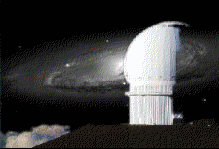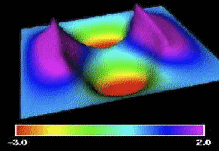Graduate Program Academic Programs
Academic Programs
The official calendar descriptions of graduate programs listed below can be found here:
Master of Science - Physics Program
The M.Sc. (physics) program requires a thesis and 12 credits of graduate-level (500+) coursework in any Science or Applied Science department. The course selection is determined in consultation with the student's supervisor and/or the Graduate Advisor.
In addition to the total credit requirement, specific courses are required:
- PHYS 500.
- One of PHYS 501, 502, 504, 508, 516, or 526.
- The colloquium course (currently PHYS 555A, 1 credit): First year MSc students are required to attend the weekly colloquia.
Master of Science - Astronomy
See the full Astronomy Degree requirements for details.
Master of Science - Medical Physics
See the full Medical Physics program requirements for details.
Master of Applied Science - Engineering Physics
The M.A.Sc. program requires a thesis and 18 credits of coursework in any Science or Applied Science department. Up to 6 credits may be 300- or 400-level courses. The course selection is determined in consultation with the student's supervisor and/or the Graduate Advisor.
In addition to the total credit requirement, specific courses are required:
- PHYS 500.
- One of PHYS 501, 502, 504, 508, 516, or 526.
Doctor of Philosophy - Physics or Astronomy
The Ph.D. in Physics or Astronomy program requires a thesis and at least 12 credits of coursework at the 500-level in any Science or Applied Science department. Courses taken for an M.Sc. or M.A.Sc. degree may be counted towards this, but students entering the program with a Masters degree are required to take an additional 6 credits of 500-level courses at UBC.
For example:
- Students who graduated with an M.Sc. from UBC and then entered the UBC Ph.D. program need to take 18 credits in all: 12 for the M.Sc. and an additional 6 for the Ph.D. If the student took more than the required 12 credits during the M.Sc. program, the unused portion may be applied to the 6 credits required for the Ph.D.
- Students who entered as M.Sc. students at UBC and did the direct transfer to the Ph.D. program need to complete 12 credits at the 500-level.
- Students who arrive directly into the Ph.D. program at UBC with an M.Sc from another institution need to take 6 credits of 500-level courses and demonstrate having the equivalent of a further 6 credits of 500-level courses from their previous institution.
The course selection is determined in consultation with the student's supervisory committee. Students entering the Ph.D. program must have the equivalent of the required courses for the M.Sc. program, or will be required to take those courses during the program. For all programs, the supervisory committee can require that the student take additional courses if the committee feels that it will be beneficial to the student's research program.
The recommended Astronomy Ph.D. coursework is discussed in the Astronomy Degree requirements.
Doctor of Philosophy - Medical Physics
See the full Medical Physics program requirements for details.
Direct Transfer to Ph.D. program
Masters students may transfer directly to the Ph.D. program during their second year, if they
- Obtain at least an 85% average in 12 credits of 500-level coursework (the Colloquium course, captured by PHYS 555A, does not count towards this average).
- Demonstrate clear evidence of research ability and approval of their supervisor.
No additional courses are required for students making a direct transfer from masters to PhD program in Physics or Astronomy.
Related Programs
The Department of Physics & Astronomy is part of many interdisciplinary graduate programs. For specific admission criteria, please consult their program websites as different programs will have different admission and application processes.
NSERC CREATE in Quantum Computer Program
NSERC CREATE Program in Quantum Computing: This unique Quantum Computing training program is co-delivered by faculty at three BC universities (UBC, SFU, and UVic) in collaboration with Quantum Computing industry partners. It will equip graduates with highly specialized technical expertise and commercial skills in both quantum computing hardware and software.
Graduate students are eligible to apply to this program.
Find out more: NSERC CREATE in Quantum Computing Program Info Slides
IsoSiM: Isotopes for Science and Medicine CREATE Program
The Isotopes for Science and Medicine (IsoSiM) NSERC CREATE program was established by TRIUMF and UBC in response to the growing importance of applications of nuclear isotopes in a broad range of fields, from environmental science, preclinical medical research, and characterization of new materials, to investigations of the foundations of the universe. This is a collaborative program involving several UBC Departments and Faculties.
Joining IsoSiM gives you access to the world’s largest cyclotron at TRIUMF, mentorship from supervisors who have over 1000 peer-reviewed papers, and elite international exchanges with our industry partners in Germany. Apart from stipends, IsoSiM provides students with enriched training experiences in the production, preparation, and application of nuclear isotopes for science and medicine that is enhanced by individualized professional skills development plans and internships.
IsoSiM’s interdisciplinary training and experiential learning activities will create the next generation of leaders in isotope-related activities.
To learn more about the IsoSiM, please visit the IsoSiM webpage http://isosim.ubc.ca/.
International PhD Program in Quantum Materials
A new joint-PhD program connecting the Stewart Blusson Quantum Matter Institute (SBQMI) at the University of British Columbia and the University of Stuttgart, with participation from the Max Planck Institute for Solid State Research in Stuttgart, Germany, offers unparalleled opportunities to study in the fields of quantum materials and quantum materials-based devices. The highly collaborative nature of the joint-PhD program means that graduate student scientists are exposed to a wide variety of experimental and theoretical techniques, and materials systems beyond their immediate research projects, and will contribute to a rapidly evolving research frontier.
Successful applicants will be outstanding and highly motivated scientists with a strong background in physics or chemistry. Strong publications on quantum materials and enthusiasm for collaborative research are expected. Enrolled students will divide their time between the three participating institutions, and will be supported by faculty at each site.
To learn more about the program, including application requirements and program contacts, please visit the program website https://qmi.ubc.ca/international-phd-program-quantum-materials.